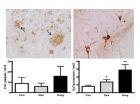(Press-News.org) Scientists from the Spanish National Cancer Research Centre (CNIO) describe how natural selection also occurs at the cellular level, and how our body's tissues and organs strive to retain the best cells in their ranks in order to fend off disease processes. These results appear this week in the new issue of Cell Reports. The research, carried out in the CNIO, is led by Eduardo Moreno, who is currently working at the University of Bern in Switzerland.
Recent studies suggest that natural selection described by Charles Darwin also occurs at the cellular level, as our body's tissues and organs strive to retain the best cells in their ranks in order to fend off disease processes.
Pancreatic cells perform very different functions from skin cells – insulin secretion and barrier protection respectively – even though their genetic material is exactly identical; and this is true of the 200 different cell types that form a human being.
Despite burgeoning interest in the mechanisms of cell competition, which keep all such functions running smoothly in each body compartment, the exact cellular and molecular mechanisms responsible for maintaining this homeostasis have yet to be established.
Through their studies on fruit flies (Drosophila melanogaster), among the most widely used animal models in research, the authors of the paper have been able to show that cell competition proceeds in various stages.
First, the cells picked as winners for their superior ability to perform cell functions eliminate the loser cells via programmed cell death or apoptosis. Then the dead cells' remains are ingested by the haemocytes, the fly equivalent of our macrophages.
"The paper's main contribution is that we provide first-time evidence of the role of the haemocytes, cells circulating in the fly haemolymph, in eliminating cell residues during competition", explains first author Fidel Lolo.
Co-author Sergio Casas-Tintó adds that the study's results indicate that the genes necessary for the haemocytes to eliminate these residues – in a process known as phagocytosis – are not required for the apoptosis of loser cells.
"We suggest that phagocytosis is not a cause but a consequence of cell death", affirms Eduardo Moreno, "and more work will need doing to determine the forces governing the selection and subsequent destruction of losers".
IMPLICATIONS ON CANCER
Cell competition is closely linked to pathogenic processes such as cancer. "There is growing evidence for the importance of these processes at tumour borders, where biological markers suggest an accumulation of dead cells, as if we were contemplating a line of battle", Lolo continues.
Understanding the mechanisms of cell competition may provide crucial insights into the earliest stages of a tumour's formation, favouring early detection, even without macroscopic evidence, and the design of new drugs able to block tumour growth from the very first development stages.
###Referente article:
Cell competition timeline: winners kill losers, which are extruded and engulfed by hemocytes. Fidel-Nicolás Lolo, Sergio Casas Tinto and Eduardo Moreno. Cell Reports (2012). doi: 10.1016/j.celrep.2012.08.012
New insights on cell competition
A research project led by CNIO scientists clarifies how tissues and organs select the 'best' cells for themselves, at the expense of 'losers' who might cause disease
2012-09-14
ELSE PRESS RELEASES FROM THIS DATE:
Trade unions still fail to lure women leaders, study finds
2012-09-14
There is little doubt that Frances O'Grady has made history as the first woman to be elected General Secretary of the Trades Union Congress in September 2012. A recent study from Queen Mary, University of London casts some light on the level of O'Grady's achievement in the wider union landscape.
This cross-national study found that in both the UK and the US, women still have fewer top positions in trade unions despite growth in overall female membership.
The paper, Lift as You Rise: Union Women's Leadership Talk, discusses the lack of women at union leadership level, ...
Getting (drugs) under your skin
2012-09-14
CAMBRIDGE, MA -- Using ultrasound waves, MIT engineers have found a way to enhance the permeability of skin to drugs, making transdermal drug delivery more efficient. This technology could pave the way for noninvasive drug delivery or needle-free vaccinations, according to the researchers.
"This could be used for topical drugs such as steroids — cortisol, for example — systemic drugs and proteins such as insulin, as well as antigens for vaccination, among many other things," says Carl Schoellhammer, an MIT graduate student in chemical engineering and one of the lead authors ...
Surgery more profound effect than anesthesia on brain pathology, cognition in Alzheimer's mice
2012-09-14
PHILADELPHIA — A syndrome called "post-operative cognitive decline" has been coined to refer to the commonly reported loss of cognitive abilities, usually in older adults, in the days to weeks after surgery. In fact, some patients time the onset of their Alzheimer's disease symptoms from a surgical procedure. Exactly how the trio of anesthesia, surgery, and dementia interact is clinically inconclusive, yet of great concern to patients, their families and physicians.
A year ago, researchers at the Perelman School of Medicine at the University of Pennsylvania reported ...
45 percent of layoff victims, despite anger, would return to former employer
2012-09-14
With an 8.1 percent August unemployment rate and 12.5 million Americans out of work, a new Temple University study examines a neglected area of research: how the unemployment process impacts the willingness of those laid off to endorse or return to their previous employer.
The study of predominantly highly paid, college-educated professionals who are unemployed finds that 45 percent of layoff victims would return to work for their former employer – despite anger over being terminated. The research also emphasizes the importance of fair and transparent layoff decisions, ...
Dr. Chiaravalloti of Kessler Foundation comments on trends in rehabilitation research in MS
2012-09-14
September 12, 2012. West Orange, NJ. Nancy Chiaravalloti, PhD, an expert in cognitive rehabilitation research, authored two commentaries on trends in multiple sclerosis (MS) research. Dr. Chiaravalloti is director of Neuropsychology & Neuroscience Research at Kessler Foundation. She was recently appointed director of Traumatic Brain Injury Research at the Foundation and also is principal investigator of the Northern New Jersey TBI System, a NIDRR-funded model system. Dr. Chiaravalloti is also an associate professor at UMDNJ-New Jersey Medical School.
Her editorial, ...
China's nuclear dilemma
2012-09-14
Los Angeles, CA (September 14, 2012) – An expert assessment of China's nuclear weapons strategy highlights the risk of escalation to nuclear war from a conflict beginning with conventional weapons, due to the unusual structure of the nation's military. The new study, previously only available in Chinese, appears in the latest edition of The Bulletin of the Atomic Scientists, published by SAGE. The authors believe that this is the first comprehensive non-governmental study on how China's nuclear-war plan was developed.
John W. Lewis and Xue Litai, of Stanford University's ...
Probing matters of the heart
2012-09-14
CAMBRIDGE, Mass. — The fate of an embryonic stem cell, which has the potential to become any type of body cell, is determined by a complex interaction of genes, proteins that bind DNA, and molecules that modify those genes and proteins.
In a new paper, biologists from MIT and the University of California at San Francisco have outlined how those interactions direct the development of stem cells into mature heart cells. The study, the first to follow heart-cell differentiation over time in such detail, could help scientists better understand how particular mutations can ...
Simple tool may help evaluate risk for violence among patients with mental illness
2012-09-14
Mental health professionals, who often are tasked with evaluating and managing the risk of violence by their patients, may benefit from a simple tool to more accurately make a risk assessment, according to a recent study conducted at the University of California, San Francisco.
The research, led by psychiatrist Alan Teo, MD, when he was a UCSF medical resident, examined how accurate psychiatrists were at evaluating risk of violence by acutely ill patients admitted to psychiatric units.
The first part of the study showed that inexperienced psychiatric residents performed ...
'Memristors' based on transparent electronics offer technology of the future
2012-09-14
CORVALLIS, Ore. – The transparent electronics that were pioneered at Oregon State University may find one of their newest applications as a next-generation replacement for some uses of non-volatile flash memory, a multi-billion dollar technology nearing its limit of small size and information storage capacity.
Researchers at OSU have confirmed that zinc tin oxide, an inexpensive and environmentally benign compound, has significant potential for use in this field, and could provide a new, transparent technology where computer memory is based on resistance, instead of an ...
Kidney society describes ways to eliminate wasteful tests and procedures
2012-09-14
Washington, DC (September 13, 2012) — Earlier this year, the American Society of Nephrology (ASN), the world's leading kidney organization, joined other groups in a campaign to help health care professionals and patients avoid wasteful and sometimes harmful medical interventions. A new article in the Clinical Journal of the American Society of Nephrology (CJASN) outlines the ASN's top five recommendations for the campaign and the rationale behind them. Following these recommendations would lower costs and lead to better care for patients with kidney disease.
Unnecessary ...
LAST 30 PRESS RELEASES:
ACES marks 150 years of the Morrow Plots, our nation's oldest research field
Physicists open door to future, hyper-efficient ‘orbitronic’ devices
$80 million supports research into exceptional longevity
Why the planet doesn’t dry out together: scientists solve a global climate puzzle
Global greening: The Earth’s green wave is shifting
You don't need to be very altruistic to stop an epidemic
Signs on Stone Age objects: Precursor to written language dates back 40,000 years
MIT study reveals climatic fingerprints of wildfires and volcanic eruptions
A shift from the sandlot to the travel team for youth sports
Hair-width LEDs could replace lasers
The hidden infections that refuse to go away: how household practices can stop deadly diseases
Ochsner MD Anderson uses groundbreaking TIL therapy to treat advanced melanoma in adults
A heatshield for ‘never-wet’ surfaces: Rice engineering team repels even near-boiling water with low-cost, scalable coating
Skills from being a birder may change—and benefit—your brain
Waterloo researchers turning plastic waste into vinegar
Measuring the expansion of the universe with cosmic fireworks
How horses whinny: Whistling while singing
US newborn hepatitis B virus vaccination rates
When influencers raise a glass, young viewers want to join them
Exposure to alcohol-related social media content and desire to drink among young adults
Access to dialysis facilities in socioeconomically advantaged and disadvantaged communities
Dietary patterns and indicators of cognitive function
New study shows dry powder inhalers can improve patient outcomes and lower environmental impact
Plant hormone therapy could improve global food security
A new Johns Hopkins Medicine study finds sex and menopause-based differences in presentation of early Lyme disease
Students run ‘bee hotels’ across Canada - DNA reveals who’s checking in
SwRI grows capacity to support manufacture of antidotes to combat nerve agent, pesticide exposure in the U.S.
University of Miami business technology department ranked No. 1 in the nation for research productivity
Researchers build ultra-efficient optical sensors shrinking light to a chip
Why laws named after tragedies win public support
[Press-News.org] New insights on cell competitionA research project led by CNIO scientists clarifies how tissues and organs select the 'best' cells for themselves, at the expense of 'losers' who might cause disease

